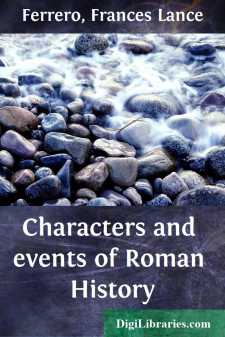Categories
- Antiques & Collectibles 13
- Architecture 36
- Art 48
- Bibles 22
- Biography & Autobiography 813
- Body, Mind & Spirit 142
- Business & Economics 28
- Children's Books 17
- Children's Fiction 14
- Computers 4
- Cooking 94
- Crafts & Hobbies 4
- Drama 346
- Education 46
- Family & Relationships 57
- Fiction 11829
- Games 19
- Gardening 17
- Health & Fitness 34
- History 1377
- House & Home 1
- Humor 147
- Juvenile Fiction 1873
- Juvenile Nonfiction 202
- Language Arts & Disciplines 88
- Law 16
- Literary Collections 686
- Literary Criticism 179
- Mathematics 13
- Medical 41
- Music 40
- Nature 179
- Non-Classifiable 1768
- Performing Arts 7
- Periodicals 1453
- Philosophy 64
- Photography 2
- Poetry 896
- Political Science 203
- Psychology 42
- Reference 154
- Religion 513
- Science 126
- Self-Help 84
- Social Science 81
- Sports & Recreation 34
- Study Aids 3
- Technology & Engineering 59
- Transportation 23
- Travel 463
- True Crime 29
Characters and events of Roman History
Description:
Excerpt
"Corruption" in Ancient Rome And Its Counterpart in Modern History
Two years ago in Paris, while giving a course of lectures on Augustus at the Collège de France, I happened to say to an illustrious historian, a member of the French Academy, who was complimenting me: "But I have not remade Roman history, as many admirers think. On the contrary, it might be said, in a certain sense, that I have only returned to the old way. I have retaken the point of view of Livy; like Livy, gathering the events of the story of Rome around that phenomenon which the ancients called the 'corruption' of customs—a novelty twenty centuries old!"
Spoken with a smile and in jest, these words nevertheless were more serious than the tone in which they were uttered. All those who know Latin history and literature, even superficially, remember with what insistence and with how many diverse modulations of tone are reiterated the laments on the corruption of customs, on the luxury, the ambition, the avarice, that invaded Rome after the Second Punic War. Sallust, Cicero, Livy, Horace, Virgil, are full of affliction because Rome is destined to dissipate itself in an incurable corruption; whence we see, then in Rome, as to-day in France, wealth, power, culture, glory, draw in their train—grim but inseparable comrade!—a pessimism that times poorer, cruder, more troubled, had not known. In the very moment in which the empire was ordering itself, civil wars ended; in that solemn Pax Romana which was to have endured so many ages, in the very moment in which the heart should have opened itself to hope and to joy, Horace describes, in three fine, terrible verses, four successive generations, each corrupting Rome, which grew ever the worse, ever the more perverse and evil-disposed:
Aetas parentum, peior avis, tulit
Nos nequiores, mox daturos
Progeniem vitiosiorem.
"Our fathers were worse than our grandsires; we have deteriorated from our fathers; our sons will cause us to be lamented." This is the dark philosophy that a sovereign spirit like Horace derived from the incredible triumph of Rome in the world. At his side, Livy, the great writer who was to teach all future generations the story of the city, puts the same hopeless philosophy at the base of his wonderful work:
Rome was originally, when it was poor and small, a unique example of austere virtue; then it corrupted, it spoiled, it rotted itself by all the vices; so, little by little, we have been brought into the present condition in which we are able neither to tolerate the evils from which we suffer, nor the remedies we need to cure them.
The same dark thought, expressed in a thousand forms, is found in almost every one of the Latin writers.
This theory has misled and impeded my predecessors in different ways: some, considering that the writers bewail the unavoidable dissolution of Roman society at the very time when Rome was most powerful, most cultured, richest, have judged conventional, rhetorical, literary, these invectives against corruption, these praises of ancient simplicity, and therefore have held them of no value in the history of Rome....


